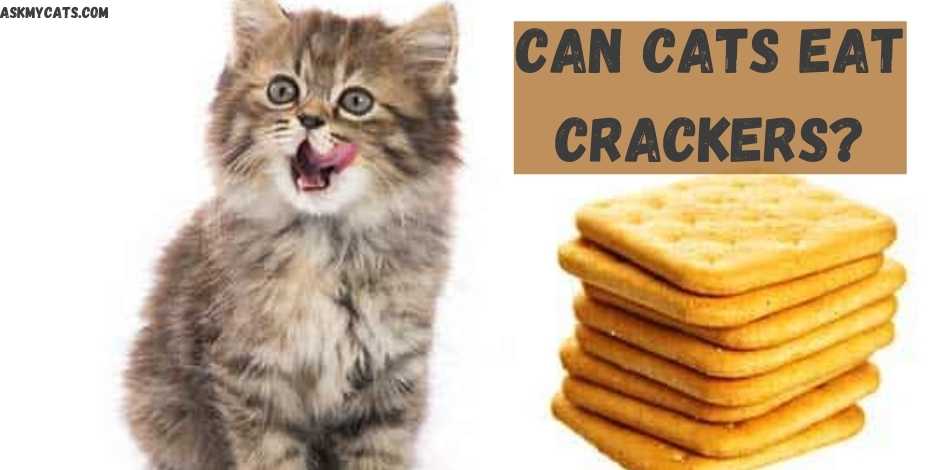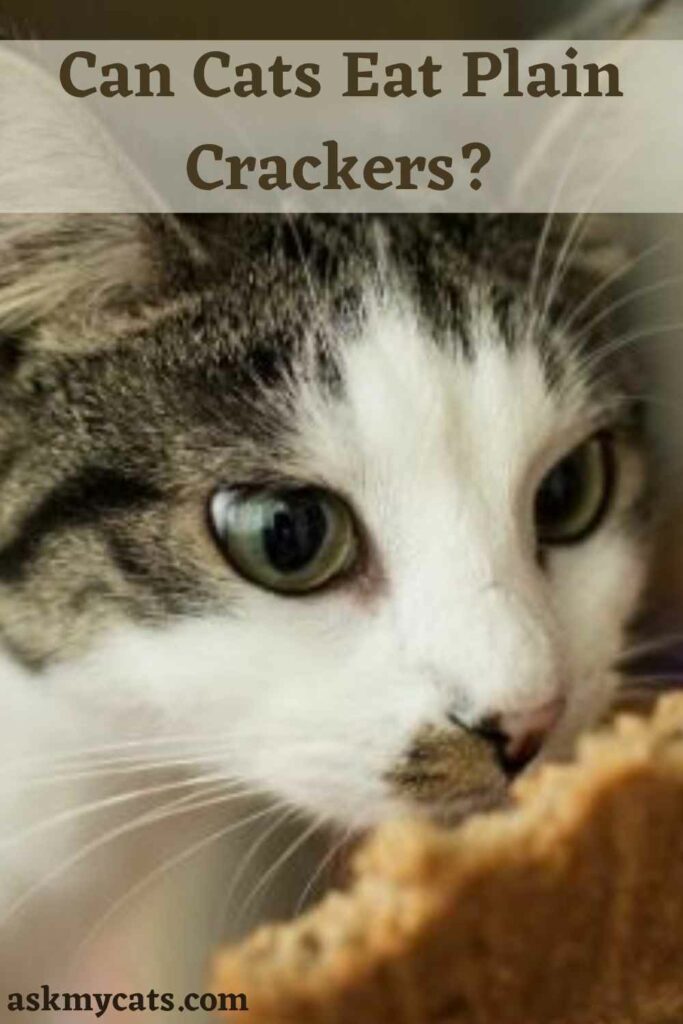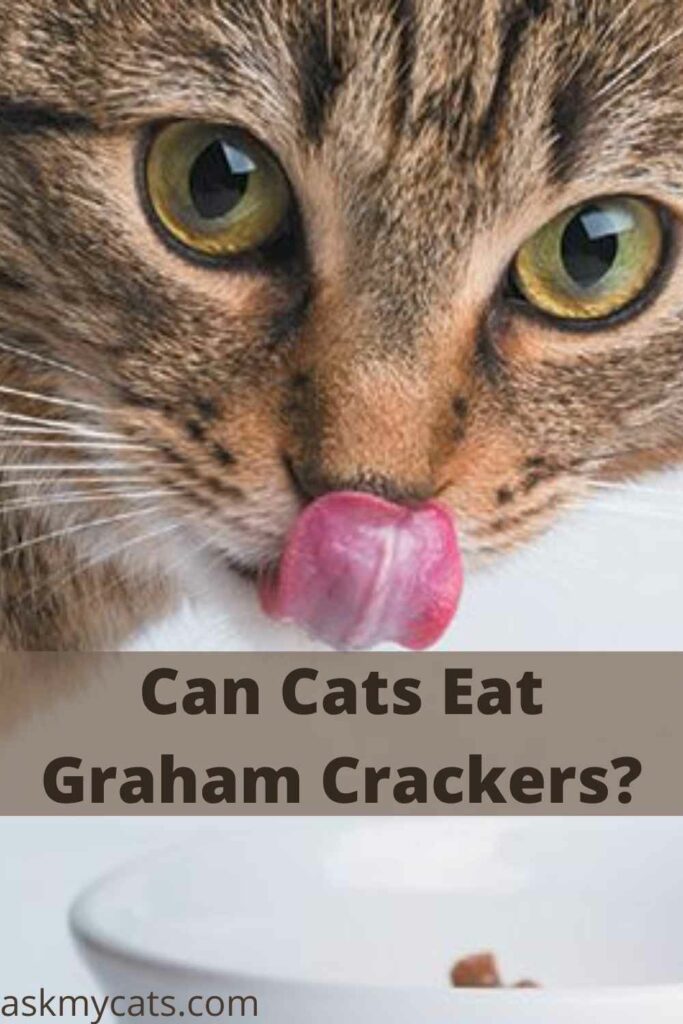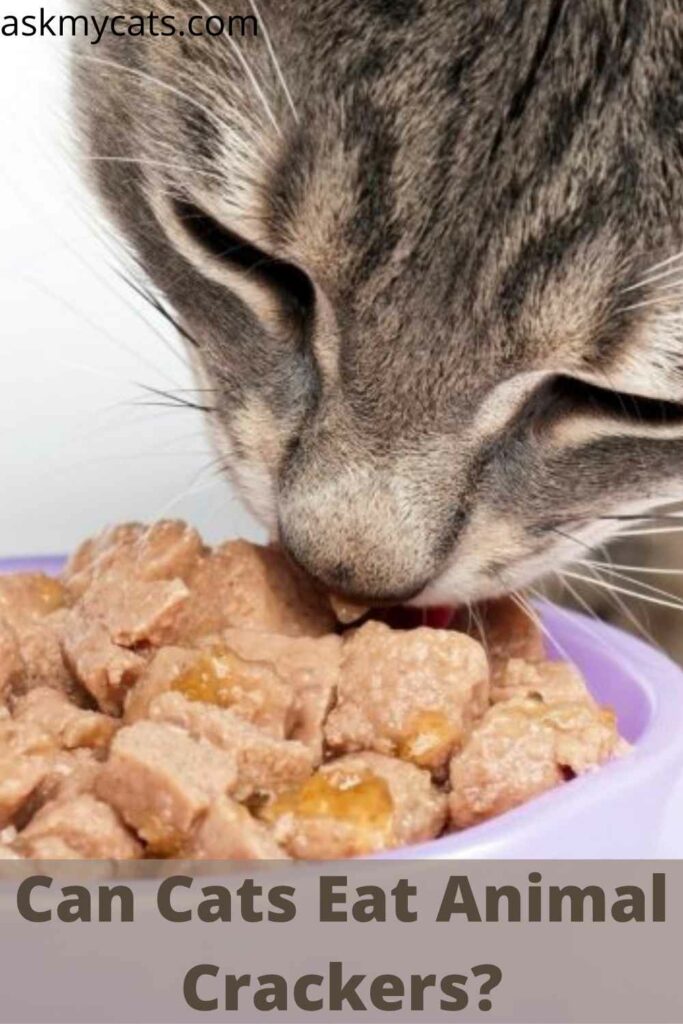Crackers are baked snack that is high in nutrients and can be eaten on their own or with additional foods such as cheese, meat, flavored dips, jam, or butter. Cracker is available in almost every country. So, can your cat eat crackers?
In a nutshell, one or two bite-sized cracker chunks are safe to eat. However, ingesting more than that can result in various side effects, ranging from minor gastrointestinal distress to possibly fatal intoxication.
This article will let you know about the variety of crackers that you can feed your cat and the ones you should avoid. So let’s get started.


Give Your Cat the Perfect Day
Get the Free Ebook!
Can Cats Eat Plain Crackers?
Yes, cats can eat plain crackers as they are not toxic for them. However, they must be given in moderation.

If there’s one thing cats enjoy doing, it’s attempting to steal food intended for people.
Unfortunately, many human foods are hazardous to cats. Some of them are outright harmful, causing significant consequences.
Baked goods, such as crackers and biscuits, aren’t very beneficial for cats, though they’re rarely deadly.
If your cat snatches a cracker from your plate, you probably don’t need to rush her to the doctor, but you should try to keep her away from them if you can.
Wheat or other grains are used to make crackers. Refined flour and starches might irritate the intestines.
Crackers contain a lot of salt, which is bad for cats.
Some crackers, such as onion or garlic powder, may include components that are actively hazardous to cats.
A simple cracker isn’t the worst thing for a cat to eat when it comes to human cuisine. The inclusion of refined flour, which does not agree with cats, is the primary source of concern.
Grain isn’t something your cat should eat on a regular basis.
They have short digestive systems and are obligate carnivores. This means they have difficulty digesting non-meat foods effectively.
When cats consume refined starches, they experience digestive problems such as nausea and vomiting. Some cats appear to be able to eat this type of food without issue, but many will experience intestinal upset.
Crackers are also typically salty. While minor amounts of salty foods won’t hurt a cat, cats shouldn’t eat salty foods on a regular basis.
Cats, in general, are prone to becoming dehydrated quickly. They don’t drink nearly enough water since they’ve adapted to get most of their fluid from their food.
Salty foods might exacerbate the problem by causing your cat’s hydration levels to decline.
Dehydration in cats causes various issues: it makes them lethargic and unhappy in the short term, and it contributes to urinary tract infections and kidney stones in the long run.
If the cracker is flavorful, it could include ingredients that are harmful to cats. Many crackers contain substances that are harmful to your pet.
The primary sources of worry would be onions and garlic. Plants of the allium family (onions, garlic, leeks, chives, etc.) have chemical elements that have a negative impact on a cat’s health.
They cause anemia, which can make your cat very sick. If the cat eats too much, the consequences can be lethal. While the levels found in a cracker may not be enough to hurt a cat, experts like to stay on the safe side.
Also, check out Can Cat Eat Donuts? Are Donuts Bad For Cats?
Can Cats Eat Ritz Crackers?
Though the ritz crackers are not toxic if eaten by cats, it is recommended to be avoided because of their high salt content.
Ritz Crackers are often made from additional oils and preservatives to give them a long shelf-life and a higher salt content than bread. The additives don’t work well for cats.
Thus while ritz crackers are not toxic, such as bread, specialists recommend that crackers not be fed to cats.
Can Cats Eat Goldfish Crackers?
Although it is not recommended for cats to eat goldfish crackers, one or two a day won’t do any harm.
Like a lot of other human food, a small number of Goldfish crackers will not hurt your cat.
Naturally, this response will differ from one feline to the next, depending on the cat’s tolerance for specific substances. A cat, on the other hand, would be fine if he ate a few Goldfish crackers.
On the other hand, snacks like Goldfish crackers should not be fed to your cat in large quantities or on a frequent basis. Goldfish crackers can cause an allergic reaction and don’t give any essential nutrients to cats.
Snacks like these are not cat food, so keep them out of reach of your feline companion. If you do feel compelled to throw a “fish” or two at your cat, make sure you understand the risks and what to do if your cat becomes ill.
What Happens If My Cat Eats A Goldfish Cracker?
Eating goldfish crackers could make your cat ill if she is allergic to wheat or gluten or if it is not given in moderation.
Feeding Goldfish crackers to your cat if they are sensitive to wheat or gluten is not an option. Wheat and gluten, as well as other components that could cause an allergic reaction, are found in goldfish crackers.
Check out more details about Can Cats Eat Wheat? Is Wheat Bad For Cats?
Even if your cat isn’t allergic to certain substances, you should keep an eye on him while he eats Goldfish crackers. You never know when your cat will have an allergic response.
Your cat could develop an unsightly and uncomfortable skin condition in the worst-case situation. Allergies to a specific food can cause a lot of discomfort in cats, and in some cases, they can even be fatal.
When your cat is introduced to Goldfish crackers or any other new food, keep a close eye on him.
Sneezing, coughing, shaking of the head, wheezing, itching, vomiting, diarrhea, gas, bloating, and other symptoms of an allergic reaction can occur. As soon as you see any unusual behavior in your cat, take him to the vet.
Can Goldfish Crackers Kill Cats?
No, goldfish cannot kill a cat as they are not toxic to them.
Unless a cat chokes on a Goldfish cracker, these crackers will not kill the cat. You must, however, give your cat appropriate nutrients if you want him to be healthy and live a long and purry life.
Cats should not consume Goldfish crackers since they are not nutritious and contain unhealthy substances.
Goldfish crackers won’t harm your cat, and they’re unlikely to create any problems. However, some human foods, like Goldfish crackers, can be harmful to your cats’ health over time.
When in doubt, consult your veterinarian before introducing a new food variety.
Can Cats Eat Graham Crackers?
It is not recommended to feed your cat graham crackers as they will have an adverse effect on your cat’s health long term.

Cats can eat graham crackers, but it is not recommended.
While your feline buddy will not die from eating Graham crackers right away, cats eating Graham crackers may have long-term health consequences.
This is due to the fact that these crackers are frequently made with additives that may upset your cat’s stomach.
In addition, because cats are obligate carnivores, eating Graham crackers provides relatively few nutritional benefits to your cat.
All Graham crackers were supposed to be flavored with natural, unprocessed sweeteners like raw honey and cinnamon at first.
Honey is safe for cats to eat. It aids digestion and alleviates allergies as long as you only feed your cat honey-flavored Graham crackers in moderation.
On the other hand, Modern Graham crackers are more likely to contain other sweeteners such as sugar, chocolate, or xylitol, all of which are potentially hazardous to cats.
Sugar is a significant contributor to diabetes, heart disease, and other cardiovascular disorders.
As a result, sugar-flavored Graham crackers should be avoided by your cat, especially if it is diabetic. Sugar is linked to tooth decay in cats as well.
The most common condiment is salt, which is commonly seen on Graham crackers. Unfortunately, salt is another food that cats should avoid.
A small amount of salt can cause salt poisoning in cats. Nausea and vomiting, diarrhea and dehydration, loss of appetite, frequent thirst and urination, lethargy, and incoordination are all indications of salt poisoning in cats.
If left untreated, the disease could progress to seizures, tremors, coma, and death. If you must feed Graham crackers to your cat, make sure the salt concentration is controlled.
Can Graham Crackers Kill Cats?
No, graham crackers will not kill your cat. However, it can make them sick with effects like vomiting, lethargy, and upset stomach.
These crackers won’t kill the cat unless a cat chokes on a Graham cracker. But if you want your cat to be healthy and live a long, whole, and happy life, you must give it the appropriate nutrients.
Because it isn’t nutritious and contains unhealthy substances, Cats should not consume Graham crackers.
Graham crackers will not harm your cat, and it is unlikely that any problems will be created. However, a few human foods can be noxious to the health of your cats over time, like graham crackers.
Consult your vet before introducing a new food product if in doubt.
Can Cats Eat Animal Crackers?
Yes, cats can have a bite or two of animal crackers as it would not harm them. However, it must be given in moderation as it provides very litter nutritional value.

The ASPCA’s list of dangerous foods for pets does not include animal crackers.
It means that giving your cat a bite or two is relatively safe, as she will not experience any severe consequences.
They are, however, not particularly nutritious. In fact, they provide very little nutrition to your pet.
Cats’ bodies were not meant to withstand a carb-heavy diet because they are obligate carnivores.
Instead, they prefer and perform better when fed a meat-based diet.
This isn’t to say that grains should be avoided entirely. However, you should keep them to a bare minimum, which includes animal crackers.
You have nothing to be concerned about if you occasionally feed your cat animal crackers.
But, on the other hand, if animal crackers are your go-to treat, whether you’re training or spoiling your cat, you might want to reconsider.
There are two issues that can develop if you give your cat animal crackers on a regular basis. The first is weight gain, while the second is the salt content of these foods.
Allowing your cat to eat too many animal crackers might lead to weight gain due to increased calorie consumption. She also won’t have room for protein-rich, high-quality cat food, which is what she really needs.
When feeding your pet medication, there are several foods that are advised. Animal crackers might be classified as belonging to this category.
Keep in mind that this food should not be given to cats with kidney or cardiac illnesses. This is due to the fact that the sodium content and calorie amounts might aggravate these diseases. Find a good alternate snack for animal crackers wherever possible.
Frequently Asked Questions
Can cats eat cheese crackers?
Ans. Yes, cats can eat cheese crackers as they are not toxic for them. However, it must be given in moderation due to its high salt content and little nutritional value.
Do cats like crackers?
Ans. Whether a cat likes crackers or not purely depends upon its personality. Some cats can be intrigued by the cracker’s unusual smell and crunchy texture, and the strong and unique scent can repel others.
Can kitten eat crackers?
Ans. Kittens should never be offered store-bought crackers, even if they are made exclusively from cat-friendly ingredients. This is because growing kittens have specific nutritional needs and their digestive systems are much more sensitive than adult cats.
Final Words
Consider the composition of your crackers the next time you want to give them to your cat. They’re poor in fiber, heavy in carbohydrates and calories, and they’re also rich in salt!
Crackers may appeal to you. However, they are nowhere to be found when it comes to nutritional benefits for your cat. They actually have aspects that aren’t good for her. As a result, you should give your cat healthier snacks instead.
Crackers not only raise the danger of weight gain, but they also take up space in her diet that could be used for protein. Remember that cats are obligate carnivores, which means they thrive on a high-protein, low-carb diet.
If you have any unanswered questions feel free to ask them in the comment section.
